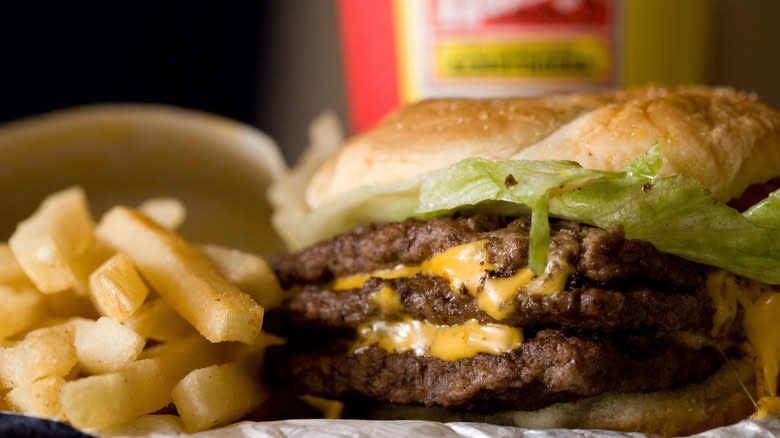Does Wendy's Really Leave Its Cheese Out For Hours?

Because Reddit users can post anonymously, the site has become infamous for spilling some of the fast food industry's juiciest secrets, as former (or current) restaurant employees use the discussion boards to answer some of people's burning restaurant-related questions. This theoretically gives consumers access to inside information that businesses may not want them to know — like the fact that some restaurants allegedly use unsafe food practices.
In one such instance, a person claiming to be a Wendy's employee began an "Ask Me Anything" (AMA) Reddit thread, inviting users to inquire about the restaurant's practices. In response to one diner's question, the alleged employee made some surprising claims about the way the restaurant stores its cheese. "We leave our American cheese out for like an hour before use, and it sits out even longer if we're slow," the user wrote. "It's called 'tempered' cheese." Their statement has not been officially confirmed.
Tempering cheese refers to the process of letting cheese reach room temperature to enhance the flavor. But because food left out at room temperature can encourage the growth of harmful bacteria and increase the risk of food-related illness, the Department of Agriculture (USDA) recommends steering clear of food that has been out of the refrigerator for more than two hours. For better or worse, however, the rules are different for the pasteurized process cheese used at Wendy's.
Read more: Fast Food Restaurants That Serve Low-Quality Beef
Wendy's Cheese Adheres To Different Safety Standards

Deemed a "nonpotentially hazardous food" by the Michigan Department of Agriculture in 1998, pasteurized process cheese (like that used at Wendy's) is held to a different standard than other "potentially hazardous foods," which are susceptible to dangerous bacteria when left out at room temperature. Because pasteurized process cheese is made with mold-inhibiting agents and additives that prevent the growth of microbes, it doesn't have to be stored at a temperature below 41 degrees, which is the Time/Temperature Control (TTC) considered safe for most non-dried food items, according to the Minnesota Department of Health. The Michigan Department of Agriculture said as much in a 2011 ruling in which it granted Wendy's the ability to keep its cheese out at an uncontrolled temperature for up to six hours.
The North Carolina Department of Environment and Natural Resources also gave Wendy's the go-ahead to leave its pasteurized process cheese out for more time than is generally considered safe; however, a 2011 letter from the agency revealed the decision was based more on precedent than legitimacy. Wendy's pasteurized process cheese met the definition of a "potentially hazardous food" by North Carolina's Rules Governing the Sanitation of Food Service Establishments, but because the agency had granted other restaurants using the same product leniency in the past, Wendy's received approval to leave its cheese out for up to eight hours before being discarded "based solely on prior approval."
Read the original article on Mashed.

 Yahoo Finance
Yahoo Finance 